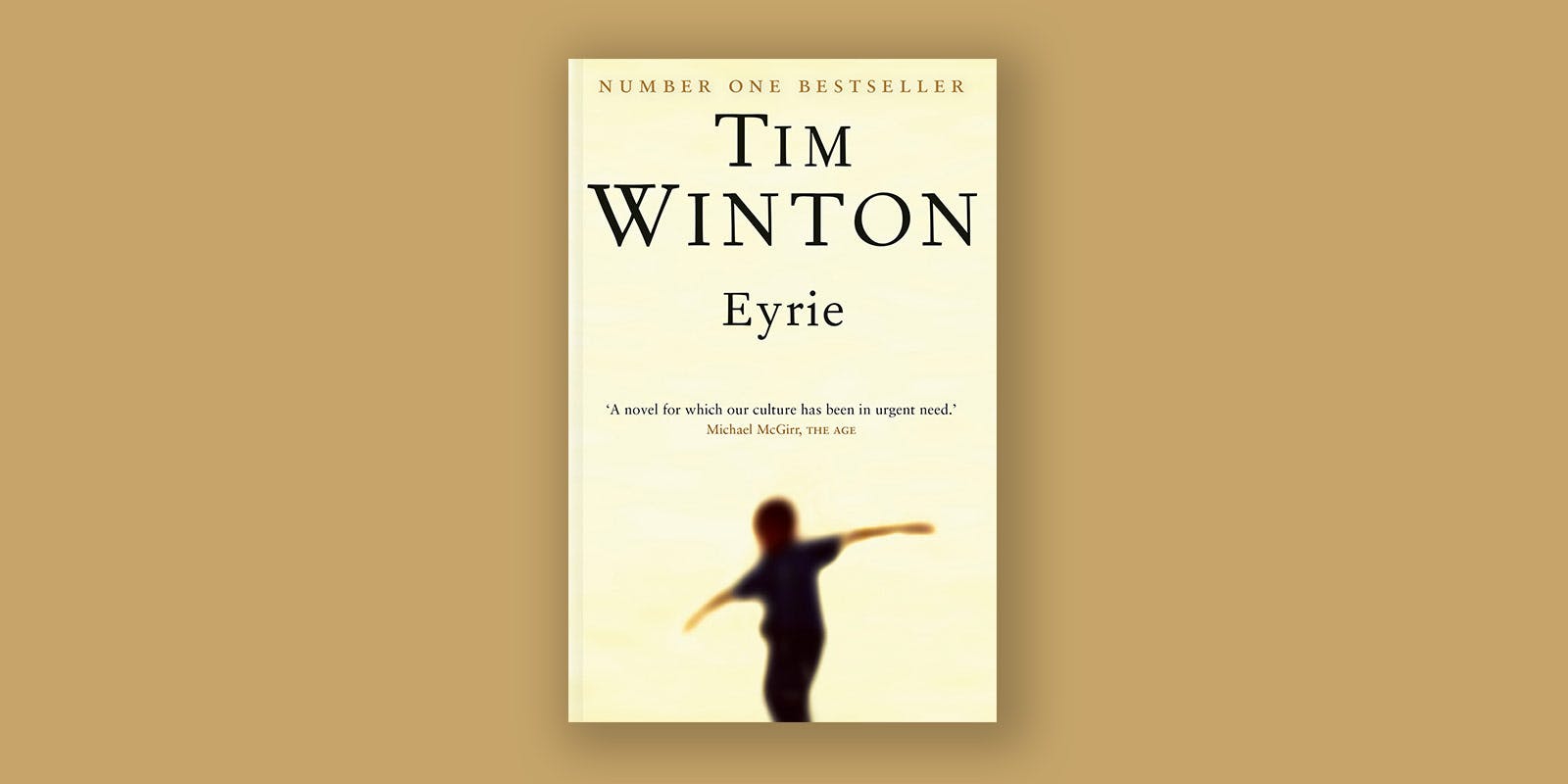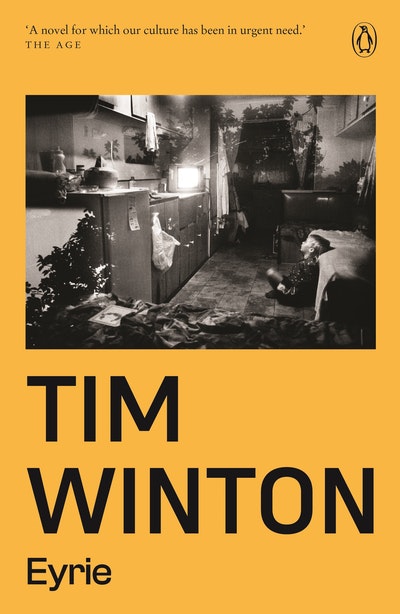Eyrie by Tim Winton: an inspired book club selection.
Longlisted for the 2014 Miles Franklin Literary Award, Tim Winton’s Eyrie is a heart-stopping, groundbreaking novel for our times – funny, confronting, exhilarating and haunting. Inhabited by unforgettable characters, Eyrie asks how, in an impossibly compromised world, we can ever hope to do the right thing. Take a look at our reading group notes and questions and make your next reading group session one to remember.
Book Summary
In middle age Tom Keely has hit the trifecta. A reluctant divorce, a missed chance at fatherhood, the loss of his job. With the latter has gone most of his conviction, the reason he's stayed out of the workforce this past year. Now his money is all but gone too, and his health is failing. Self-medicating his brutal headaches gives little relief and lately he's started having odd turns. To all appearances he's sunk as low as possible, and yet he retains a sense of having further to fall, of waiting for a bounce off the very bottom before he can begin to recover.
His shabby flat in Fremantle has a spectacular view, but even this is sullied. After fifteen years with an environmental group Keely doesn't just see an ocean vista, but the damage done to the seabed by dredging it. He sees the unequally distributed spoils of the mining boom moving through the port. He sees, in short, a society as harsh as his own situation, a natural world under siege. And Keely isn't the kind of man to turn a blind eye to injustice.
It's a trait that cost him his job, and one he inherited from his father, a physical and moral giant who never shrank from the good fight. Nev's virtues have magnified since his death, leaving Keely all too conscious of the 'father-shaped hole in him', something brought into even sharper relief when he meets a strange, precocious young boy who's never had a proper father at all. Kai's grandmother – in every way that counts his actual mother, with his birth mother doing time – was a childhood neighbour of Keely's. Now she's again living a few doors from him, in the Mirador, Fremantle's sole highrise. Though the decades between have accentuated their differences, Keely suddenly finds himself a part of Gemma and Kai's little world. Just as suddenly he regrets his loss of privacy.
Keely is acutely aware that a year is more than enough time to have pulled his life back into some sort of order. Certainly his mother believes so, and his guilt at causing her worry adds to his anguish. He loves and respects Doris even as he avoids her, rattled by her acumen regarding him, shamed by her compassion. A social worker turned benevolent lawyer, Doris has seen plenty but has never lost her resilience, and that's another thing Keely can't face. He remains tortured by how to live in a world he considers profoundly corrupted. Having thus cut himself off, he gets enmeshed in something he didn't see coming at all.
This is precipitated by Kai's father Stewie, a nasty meth-head who despises his unusual son, sending one of his thugs to extort money from Gemma. The Mirador is no longer safe and Doris, without hesitation, takes all three of them into her house in a leafy part of Perth. But no roof could be large enough for the complexities of the lives now under this one. Gemma, who as a child idolised Doris and wanted her for her own mother, feels condescended to. Doris thinks Gemma's hard life has made her manipulative, and she adds Keely's deteriorating health to her list of concerns about him. Inside this pressure-cooker, where Kai is a constant witness, things inevitably explode.
To his sister Faith, Keely has always been 'a man who needed reminding he had a mother'. Unable to get past the huge absence of Nev, he doesn't fully see Doris, however highly he thinks of her. Desperate to prove himself worthy of his father, he's preoccupied by what Nev would have done for Gemma and Kai. With his mental and physical state declining by the day, Keely's behaviour grows bizarre; the worst of causes are ascribed to it and his character is maligned all over again. His faltering judgement helps bring Stewie's thug to his own door.
Eyrie looks unflinchingly into every chamber of the human heart. It's not always a comforting sight and the novel might perhaps seem bleak, even with its exhilarating humour and exquisite appreciation of life, its peerless use of language, if read only for the narrative of Keely's fate – whether he succeeds or fails, lives or dies. But as with all Tim Winton's fiction, beneath this story lie multiple others, with thematic veins running just as deep. It is a measure of Winton's artistry that these aspects defy quick summation or exposition. This is a novel to be absorbed, digested, as much as rationally understood. The limitation of knowledge is in fact a powerful element in it, one indicator of which is Kai's prescience, his mysterious affinity with Keely. It perhaps points us to the importance of recognizing life's key moments, and not just seeing them, but acting on them. With perception, Eyrie implies, comes responsibility. Keely's rumination on the greed that drives the destruction of the natural world evokes the fear behind the denial of death. 'It's so much easier to fill a void than to contemplate it,' he notes. Yet the novel avoids falling into the abyss it depicts, for Keely has come to his own acceptance, however shaky, one we glimpse in the penultimate chapter. Here, amid his turmoil, is a vision of peace. We sense that he is fundamentally all right, something he confirms to a bystander on the final page. He is possibly dying, but he's all right. Tom Keely, who on the surface is an embodiment of failure, has on the level that matters lived a successful life after all. And from a larger perspective still, where falling and rising don't come into it, we sense that he intuits all manner of things to be well.
About the Author
Tim Winton has published twenty-five books for adults and children, and his work has been translated into twenty-eight languages. Since his first novel, An Open Swimmer, won the Australian/Vogel Award in 1981, he has won the Miles Franklin Award four times (for Shallows, Cloudstreet, Dirt Music and Breath) and twice been shortlisted for the Booker Prize (for The Riders and Dirt Music). He lives in Western Australia.
Book club discussion questions
- Keely thinks that applying the concept of goodness to himself is 'something of a stretch', that he's 'righteous in a misanthropic way' (page 42). Is he too hard on himself? What drives him, do you think? What's behind his refusal to seek medical advice?
- What do you make of Kai? Discuss his character in terms of his behaviour, his affectlessness, his seriousness, his dreams, his intelligence, his language use, his uncanny characteristics, his obsession with birds, his relationship with Gemma, his social isolation, his fixation with death. What do you think is going on between him and Keely?
- Do you agree with Doris that Gemma's hard life has made her manipulative? Is the latter's relationship with Keely driven by nostalgia and physical need, or something else? What do you think she's doing when she goes out dressed to the nines?
- How much of the Australia you live in do you recognize in Keely's assessment of his city and state?
- Doris is a woman of enormous strength, integrity and kindness, yet Keely is unable to be completely honest with her: why do you think that is? Is it just because of his preoccupation with his father, or is there something else at work here?
- One of the questions Eyrie poses is how best to help – others, yourself, the planet. Discuss the many ways in which this issue is presented in the novel. Is Doris right not to give Gemma the money demanded by Stewie, in your opinion?
- How do you interpret Keely's demon-possessed next-door neighbour? What role does her fighting off of evil play?
- Consider Eyrie's multiple uses of the idea of falling. What do you think Keely means at the end of the book when he understands that he's fallen?
- Vision is a large element in Eyrie. The issue of how much of the whole any one of us can see; how much we let ourselves see and how much we willingly make ourselves blind to; how much we assume from what we see. Consider all aspects of this in the novel.
- What does Eyrie show about social class in contemporary Australia? Discuss this particularly in respect of the diverging paths of Doris and Gemma, both women of working-class origin; in respect of Doris and Keely's differing views of themselves; and in respect of the subclass represented by Stewie and Clappy.
- What is your opinion of Harriet? Is she, also, perhaps too hard on herself? Was she too hard on Keely? Part of his backstory rather than a protagonist in the novel, she is nevertheless a key part of his thoughts: what does her character suggest about the quality of forgiveness?
- Consider the ways in which birds feature in the novel. What does the osprey symbolise for you?
- The Mirador is depicted as a live thing: it twitches and moans, has bones and a personality, is referred to by name. Consider that personality and its role, particularly through the lens of the novel's title.
- A large part of Eyrie is a father-son story: Keely's relationship with his own father, his father-like role to Kai. What does the novel have to say about men and fatherhood? And how alike do you find Keely and his father? How similar are their trajectories?
- What does the stain on the carpet signify to you?
- Discuss the features Eyrie has in common with American Southern Gothic literature (William Faulkner, Flannery O'Connor, Carson McCullers, and others).













